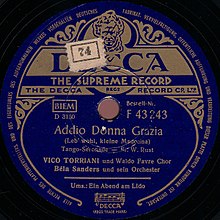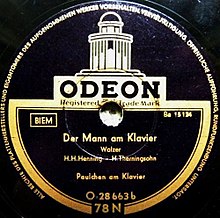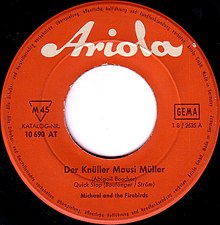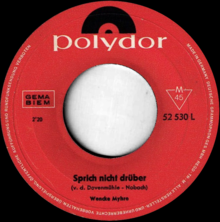Nils Nobach
Nils Nobach ( Kurt "Kurding" Nobach ; * July 31, 1918 in Neustrelitz / Mecklenburg; † May 28, 1985 in Las Ledas / La Palma ) was one of the most successful German hit producers and composers of the 1950s and 1960s and is considered the discoverer of Bibi Johns , Angèle Durand , Wolfgang Sauer , Fred Bertelmann and Conny Froboess . Nobach also appeared as a hit writer under the pseudonym Peter Ström and Lambert Fleming .
Career
The biography of his widow Maike Nobach-Bergen only gives a fragmentary look at his professional career and his successes. Nobach's grandparents ran a nursery in Neustrelitz, where he was born. The only child of Martha Niekrenz and Paul Nobach († 1939) started as a theater actor in the Hamburg theater in 1939 after completing a commercial apprenticeship; In the same year he married the daughter of the acting teacher Carl Wüstenhagen, Sigrid Wüstenhagen; the marriage was very short-lived. In 1942 he moved to the theater in Cottbus . After the war, from September 1945, he worked as a radio presenter for the NWDR on the program Was ist Swing? . At NWDR, where he also directed live broadcasts, he stayed until 1949. Under Gerhard Mendelson he worked briefly as a music producer in the Hamburg studio of the Austrian record label Austrophon .
Music producer at Telefunken
In 1950 he went to Telefunken (Teldec) as production manager under Herbert Grenzebach , where in 1951 he and Vico Torriani produced his first record Ein Abend am Lido / Addio Donna Grazia (Decca # F43243). In March 1951 he discovered the Belgian singer Angèle Durand after a performance in the Hamburg Er-und-Sie-Bar . In July 1951 he got her a record deal with Telefunken, who recorded with her on August 1, 1951 When Mademoiselle Kisses Dich , based on the French chanson Sous le ciel de Paris , and Kurt Weill's September song . By March 1953 Nobach had produced over 10 other titles with her.
Music producer at Electrola
In April 1953, both moved to Electrola , where Nobach was promoted to production manager. In fact, he was also the A&R director there, because he discovered a large number of interpreters that he could win for Electrola. Here Nobach produced the first big hit for Angèle Durand with So ist Paris (Electrola # 8617; September 1956; 2nd place in the German hit parade ), the German version of Paris Canaille . Durand brought more titles to the charts with Nobach productions, but it wasn't until November 1958 that Hula Hoop was the second biggest success with a third place on the German charts. Nobach and Durand had previously married on August 18, 1958 in Cologne. He still produced them until November 1960, then Hans Bertram took over the supervision until October 1961, and Nobach divorced in October 1961.
Wolfgang Sauer
Nobach discovered the blind Wolfgang Sauer after radio recordings in Baden-Baden and Stuttgart. His first hit Eine Melodie geht um die Welt (EG 8033) he produced on January 24, 1954. Sauer's biggest hit was the cover version of the 1952 title Mütterlein , which was created as Glaube mir (EG 8055) on March 5, 1954 and after publication sold over 500,000 times in October 1955. Sauer's first hit parade was Cindy, Oh Cindy (EG 8667) , created on January 18, 1957, with a German text by Kurt Feltz , which took first place for three weeks. However, the success was impaired because the competition at Polydor pushed a version by Margot Eskens , which after publication in February 1957 advanced to number one with ten weeks to the second most successful single of 1957. On the same recording date , Why do the stars shine so bright tonight was made , which after its publication in March 1957 reached second place. With Sauer, Nobach also produced his favorite style of music, jazz . So on April 28, 1955 the classic Basin Street Blues with Sauer's Blue Rhythm All Stars was born .
Bibi Johns
The Swedish singer Bibi Johns received a recording contract with RCA in the USA in December 1951 and stayed there until June 1953. When she visited her father afterwards, she met Nobach, who took her to Germany for test recordings. On October 26, 1953, Bibi Johns made her first recording in German, Bella Bimba (composed by Kurt Feltz) / Ich haben Such Angst (October 27, 1953), composed by Hans-Arno Simon and Peter Ström (EG 8020) , then Little Rock / Bye Bye Baby (November 17, 1953; EG 8022) and the first big hit Sehnsucht (November 2, 1953) / I have such fear (8019), which was the first of the recordings to hit the market in November 1953 . When the first German charts were published in 1956, Bibi Johns could no longer celebrate any great successes.
Paul Kuhn
Bibi Johns also sang in the company of Paul Kuhn , a Berlin jazz musician who was also discovered by Nobach. Gilli Gilli Oxenpfeffer, Katzenellenbogen in Tirol / My Pretty Sugar was created on September 22nd, 1954 with Paul Kuhn under the production direction of Nobach. As a soloist, Kuhn recorded his first record on February 23, 1954 with Ach Walther, Walther, Walther / Oh if I had the feeling (Columbia DW 5325). The title The Man at the Piano , performed with a surging voice , was created at the end of 1954 (EG 8639; Odeon O-28663), after publication in August 1955 it sold over 250,000 copies and reached number 4 in the charts. Nils Nobach had to persuade the jazz musician Paul Kuhn to bring out this mood song because if he was successful he could earn a lot of money with it. Paul Kuhn: “I didn't want to sing that, I resisted it. The producer Nils Nobach persuaded me to: 'Think about how much money you can earn as a pop singer when the thing hits the mark.' Yes it's right. I recorded the record for money ”.
Fred Bertelmann
In 1955 Nobach had also discovered Fred Bertelmann for Electrola, but he left Bertelmann to his producer colleague Hans Bertram, who still produced a series of hits with him in 1955. Nobach, who wrote a total of 13 titles for Bertelmann under the pseudonym Peter Ström, only produced one hit for Bertelmann with hit parade format , namely your tender smile (December 17, 1958), which came up to sixth on the hit parade. Another 14 Bertelmann titles produced by Nobach did not make it into the charts.
Conny Froboess
Nobach gave the teen idol Cornelia Froboess the nickname "Conny" and the German-language version he wrote (again under the pseudonym Peter Ström) of the world hit Diana , which was the first single after its release in January 1958 to reach number two in the German charts could and initiated the hit career of the child star. Producer Nobach met Conny and her father Gerhard Froboess at a club in Zurich at the end of 1957 and helped her to get a record deal with Electrola. The second single was originally from Paul Anka , namely I Love You Baby . After it was published in April 1958, it also climbed to second place. Nobach takes over the music production for the cinema film Hula-Hopp, Conny , which premiered on March 5, 1959 , and other music productions for films with Conny Froboess, which also successfully stayed in the charts until August 1962.
More artists
Eddie Constantine made his first recordings under Nobach in 1953 with his Viennese German with an American-Russian-French accent, but the label refused to accept Constantine's demand for a guaranteed annual fee of DM 40,000. Nobach later wrote You are my dearest guest for Constantine in 1957 when he was singing at Capitol .
Ralph Bendix had brought the religious title In the Beginning by Frankie Laine from December 1954 from a trip to America and played it to Nobach. Wolfgang Neukirchner (Adolf von Kleebsattel), full-time administrative judge, wrote a cover version in German under the title It was in the beginning (EG 8650). Despite the Protestant church's negative attitude towards a review copy, Nobach was convinced of the piece of music and had it published in March 1957. The subsequent partial radio censorship helped - the single did not get into the charts.
Nobach discovered Rex Gildo in 1958 , arranged for him a record deal with Electrola and wrote the lyrics for the duet with Vivi Bach Singen Swingen (August 1960). From then on, however, Rex Gildo was alternately taken over by other producers and switched to Ariola in 1966. In 1963 Gitte Hænning brought out the super hit Ich will 'nen Cowboy als Mann , which Nobach wrote together with Rudi von der Dovenmühle , produced by Heinz Gietz . Gitte thus first took first place in the German Schlager Festival on June 15, 1963, and after publication in June 1963 sold 500,000 copies by the end of the year and 1,050,000 by June 1965. The title with the unusual hit text occupied the top position in the charts for ten weeks . Nobach wrote a defiant parody with admonishing parental dissenting voices that advised her daughter to choose men with solid professions.
With the Nilsen Brothers , Nobach produced the American classic Tom Dooley in November 1958 , which after its release in December 1958 occupied number one in the German charts for seven weeks and was sold 1.3 million times. In July 1960 he wrote the title The Cowboys of the Silver Ranch for the Nilsen Brothers together with Angèle Durand . Nobach discovered the former British Army member Billy Sanders in the Tabaris Club in Düsseldorf. On April 3, 1958, the first single was titled Party . Nobach took Sanders to Ariola , where Hello Mr. Twist was written on November 15, 1961 . The only hit produced was the mood title Gartenzwergmarsch from June 1962 (text: Hans Bradtke ), which made it to number 12 in the charts.
Music producer at Ariola
In November 1961 Nobach became the head music producer of the Ariola production branch, which was newly opened in Cologne; Heinz Gietz (Music Director) and Günter Ilgner (Commercial Director) took over his position at Electrola in October 1961 .
Nora Nova was discovered by Nobach in 1960 and unsuccessfully recorded three singles on Electrola. Together with Nobach, she switched to Ariola in 1961, where the first track was Che Vero / Am weiß Strand von Santorin (# 222), but only men were a dime a dozen in January 1963, and in January 1963 she reached number 20 in the German charts. But then the singer, completely unknown in Germany, was given the honor of representing the country at the Eurovision Song Contest in Copenhagen in 1964 . Nobach writes a chanson-like text under the title You get used to beauty so quickly (# 15866), his closest friend Rudi von der Dovenmühle contributes the music. The title took part in the Eurovision competition on March 21, 1964 in Copenhagen, but landed 13th without any points.
In March 1963, Ariola label boss Rolf Engleder brought Marlene Dietrich and Sophia Loren to the label, which Nobach produced as well as Dalida and Zarah Leander .
Nobach produced Michael and the Firebirds ' first single , Der Knüller Mausi Müller / Wir sind eine Dancing Band (Ariola # 10 690), which was released in July 1964 in mono. The A-side is the German version of Abigail Beecher by Freddie Cannon , for which Nobach wrote the German text when Peter Ström. The unknown group was named after Michael "Mike" Kogel, whom Nobach brought together in 1966 with the Spanish band "Los Sonor". In April 1966, the group renamed Los Bravos recorded the summer hit Black is Black .
Back at Electrola
According to Billboard, Nobach returned to Electrola in January 1967. One of his first tasks was on September 7, 1967 the production of the music tracks for the Wanda Jackson titles Farewell Roses , The Moon is the Friend of Lovers , Addio My Love and Gone With the Wind , which took place on November 7, 1967 in the Capitol Recording Studios in Hollywood were completed with Wanda Jackson's voice. Cliff Richard , a star in his home country Great Britain, came to Cologne and had Nobach produce the title It is not good to be alone (text by Nobach, music by Charlie Niessen). In December 1967, the title hit the charts, where it could only penetrate to number 21. Then Cliff Richard had the German version of his English hit Congratulations (Man congratulates me) produced on April 9, 1968. Cliff had already recorded German cover versions of his English hits in the early sixties, often using the original music track, so that only the German text had to be recorded.
1970s and later
In the 1970s, Nobach's activities decreased noticeably. In November 1968, he oversaw Adamo's recording of The Journey A Tear , which had some complications. Adamo did not agree with a passage of text, and successful copywriter Carl Ulrich Blecher had to travel from Berlin to Cologne specially. With a second place it became Adamo's most successful song. Nobach wrote Let's Sing for Gilbert Bécaud in 1972 , Erik Silvester took over Venga Toro in July 1973, Adamo took up This World Is a Fun Fair (1974) and Fatty Jack sang Nobach's Die Niete aus der Klasse (1975).
Since 1971, Nils Nobach was married to the Surinamese Maike Nobach-Bergen in their fifth marriage . For health reasons Nobach moved in 1973 from the Cologne suburb Bergheim -Ahe with his wife to La Palma . He has two daughters, Nuria (* 1975) and Nadine (* 1977). The widow and author of his biography lived with him permanently on La Palma since 1977, where he retired as a pensioner. He died there in 1985 at the age of 66.
Hit writer
In addition to his main activity as a music producer, Nobach wrote as Peter Ström, initially together with Hans-Arno Simon (music, and interpreter in the trio Hans Arno Simon / Frido Grothey / Rudolf Klaus) in 1953 the hit classic Oh, don't always say fat to me (EG 7972 ). Bibi Johns took over I'm so scared (October 27, 1953). Numerous titles were written for Fred Bertelmann: She says no no no (recorded on April 17, 1956), The Perlentaucher von Santa Margherita (music Rudi Lindt = Rudi von der Dovenmühle; June 13, 1956), Marie with the cheeky look (20. October 1956), Bahama Melodie (1959), The Blue Sea and You (June 24, 1959), The Stupid In Life Is Always the Man (duet with Chris Howland ) (1959), The Ballad of the Pirate Jim (October 25, 1959 ), Ti Amo Marina (October 25, 1959), In the streets of Roma (January 16, 1960), My heart stays at home (January 16, 1960), And only the women are to blame (Duet with Howland ) 1960, but your name is Pia (1971). Wencke Myhre took over Sprich not about it (with Rudi von der Dovenmühle) (1965), on my account the comma is too far left with Bully Buhlan (December 12, 1966) or Cindy Jane (B-side of Monja) in September 1967 for Roland W.
Film music
Under the pseudonym Peter Ström, Nobach also appeared as an author together with partners on film scores. He wrote the teenage melody from the film Wenn die Conny mit dem Peter (premiere: December 18, 1958), Mr. Music and Oh wiewohl in Tirol from the film If my big brother only knew (August 13, 1959), Lago Maggiore from the film Conny and Peter make music (music by Gerhard Froboess, August 12, 1960) as well as several lyrics for the Heimatfilm Die Zwillinge vom Zillertal .
Nobach wrote the music for the Heimatfilm Almenrausch und Edelweiß (December 20, 1957), was music director or music producer for the films Das Blaue Meer und Du (1959), Ja, Such a Mädchen mit 16 (1959), guitars sound softly through the night ( 1959) or My niece doesn't (1960).
Individual evidence
- ↑ Maike Nobach-Bergen: The heavenly times of Nils Nobach: Memories of a great music producer , 2002.
- ↑ Maike Nobach-Bergen: The heavenly times of Nils Nobach: Memories of a great music producer , 2002, p. 25.
- ↑ so he directed together with Hans Freese on February 19, 1949, on the occasion of the start of broadcasting operations in Oldenburg, the evening show Bunter Abend - How about Oldenburg!
- ↑ Maike Nobach-Bergen: The heavenly times of Nils Nobach: Memories of a great music producer , 2002, p. 73.
- ↑ which was allowed to go on a European tour with Duke Ellington in 1950
- ^ Theme music from the film comedy of the same name, which was released on March 28, 1956 in France; Original by Léo Ferré , 1953
- ↑ The piece was based on Charlie Chaplin's Limelight from 1952
- ↑ Original by Leila Negra , composed by Gerhard Winkler / Fred Rauch
- ↑ also the previously recorded on January 24, 1954 B-side Tears in the eyes was a German cover version of Crying in the Chapel .
- ↑ Sauer on piano, Carlo Bohländer (trumpet), Hans Büttermann (trumpet), Glen Buschmann (clarinet), Gerd Hühns (guitar), Hans Hohagen (bass) and Hans Podehl (drums)
- ↑ Peter Ström was Nobach's pseudonym often used in compositions
- ↑ I slept in the luggage net , Der Tagesspiegel from March 22, 2008.
- ↑ Sugar for the monkey , Der Spiegel 44/1958 of October 29, 1958, p. 50 f.
- ^ The spiritual father of Heino , Zeit Online from April 16, 1993.
- ^ Religious hits - Oh, Mensch , Der Spiegel 11/1957 of March 13, 1957, p. 4 ff.
- ↑ both under their pseudonyms Rudi Lindt / Peter Ström
- ^ Joseph Murrells, Million Selling Records , 1985, p. 163
- ↑ Rock & Roll Forum on Billy Sanders
- ↑ Billboard Magazine, July 24, 1961, p. 21
- ^ Ariola Lines up Loren, Dietrich , Billboard-Magazin of March 23, 1963, p. 29.
- ↑ Maike Nobach-Bergen: The heavenly times of Nils Nobach: Memories of a great music producer , 2002, p. 95
- ↑ Billboard Magazine, Jan. 21, 1967, p. 64
- ↑ He had written many German texts for the English versions of the Cliff Richard hits
- ↑ Maike Nobach-Bergen: The heavenly times of Nils Nobach: Memories of a great music producer , 2002, p. 36
- ↑ Maike Nobach-Bergen: The heavenly times of Nils Nobach: Memories of a great music producer , 2002, p. 106
| personal data | |
|---|---|
| SURNAME | Nobach, Nils |
| ALTERNATIVE NAMES | Nobach, Kurt; Nobach, Kurding (nickname); Ström, Peter |
| BRIEF DESCRIPTION | German composer |
| DATE OF BIRTH | July 31, 1918 |
| PLACE OF BIRTH | Neustrelitz |
| DATE OF DEATH | May 28, 1985 |
| Place of death | Las Ledas, La Palma |






